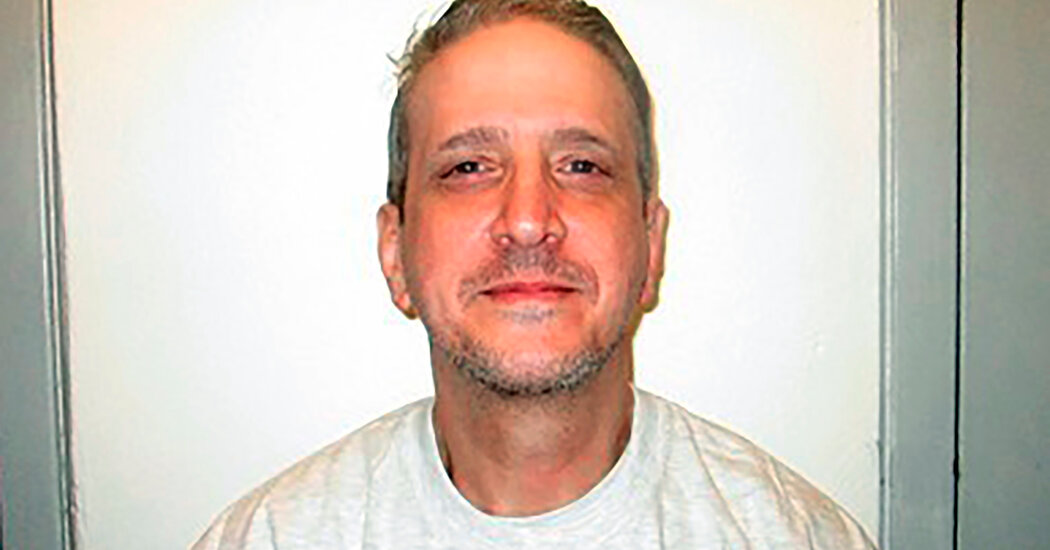The Supreme Court on Friday granted a stay of execution for the death row inmate Richard Glossip after Oklahoma’s attorney general made an extraordinary plea to stop what he says would have been an “unthinkable” error. The court put the execution on hold while it considers whether to formally review the case.
That request from the state attorney general, Genter Drummond, a pro-death-penalty Republican, was the latest effort to stop the scheduled May 18 execution of Mr. Glossip, who was convicted of arranging the 1997 murder of a motel owner in Oklahoma City and has been in prison for almost 25 years. Mr. Drummond argued that Mr. Glossip’s conviction was “unsustainable” and “a new trial imperative.”
Advocates for Mr. Glossip have argued that new evidence discovered in independent investigations — combined with problems with the state’s prosecution and the destruction of evidence — strongly suggest that there was not enough evidence to warrant a conviction, let alone a death sentence.
Mr. Glossip’s case has been taken on by various supporters, including state lawmakers from both parties, Kim Kardashian and Mr. Drummond, who has said that carrying out a death sentence would be a “grave injustice.”
Gov. Kevin Stitt, also a pro-death-penalty Republican, has twice delayed Mr. Glossip’s execution while a court evaluated his appeal. But after a parole board was split on whether to recommend clemency last month, Mr. Stitt signaled that he would not issue another stay.
Now, Mr. Drummond, who does not believe Mr. Glossip was given a fair trial because of multiple errors involving both testimony and evidence, is asking the Supreme Court to intervene. If the Court takes up the issue, it will do so under rare circumstances: Both the state and the defense are asking for the same thing.
What is Richard Glossip accused of?
Mr. Glossip, 60, was convicted of arranging the 1997 murder of Barry Van Treese, who owned a motel in Oklahoma City where Mr. Glossip worked as a manager. Prosecutors argued that Mr. Glossip promised the motel handyman, Justin Sneed, $10,000 to kill him. Mr. Sneed ultimately pleaded guilty to first-degree murder under a deal in which he testified against Mr. Glossip and was sentenced to life in prison without parole for beating Mr. Van Treese to death.
But a pair of recent investigations cast doubt on Mr. Glossip’s involvement, and his lawyers and supporters argue that Mr. Sneed carried out the killing on his own.
According to interviews from inmates incarcerated with Mr. Sneed on unrelated charges, Mr. Sneed said he had acted alone to rob Mr. Van Treese of money that Mr. Sneed and his girlfriend planned to use to buy drugs. Mr. Sneed also has a history of mental illness, which was not disclosed at the time.
None of the inmates’ accounts were heard by the jurors who convicted Mr. Glossip and sentenced him to death. A memo recently found in the district attorney’s office also detailed how the trial prosecutor worked behind the scenes with Mr. Sneed’s lawyer to feed Mr. Sneed information before he testified.
Mr. Glossip’s execution has been rescheduled eight times since 2015.
Mr. Glossip was first convicted of capital murder in 1998, but that decision was overturned in 2001 because of ineffective defense counsel. He was re-convicted in 2004 and again sentenced to death.
In 2015, Mr. Glossip was granted a stay of execution shortly before he was scheduled to be put to death after he and two other inmates argued that Oklahoma’s lethal injection protocol was unconstitutional. The U.S. Supreme Court later upheld the state’s drug protocol, but Mary Fallin, the governor at the time, issued a temporary stay for Mr. Glossip to determine whether one of the drugs used in the lethal cocktail complied with the state’s regimen.
Mr. Stitt has twice delayed Mr. Glossip’s execution while a court evaluated his appeals. In April, the Oklahoma Court of Criminal Appeals upheld his conviction, despite the state’s “confession of error.” A few weeks later, the Oklahoma Pardon and Parole Board declined to recommend clemency for Mr. Glossip. The vote was 2-2 with a fifth member recusing himself.
State Representative Kevin McDugle, a Republican lawmaker who supports the death penalty, has said he will vote to outlaw executions in the state if Mr. Glossip is put to death.
Family members of Mr. Van Treese, the victim, described Mr. Glossip during the hearing as a “habitual liar.” They said they did not want an innocent man to be executed but felt Mr. Glossip was responsible for the killing.
What happens next?
The Supreme Court’s stay will remain in place while the justices decide whether to hear the case and, if they do, until they decide it.
“The stakes could hardly be higher and the consequences of an unjust result irreversible,” the state wrote in its filing requesting the stay.
Should the case make it to oral arguments before the court, a familiar face may follow: Paul D. Clement, who was U.S. Solicitor General under President George W. Bush, is the lead lawyer representing the state and has argued more than 100 cases before the court.
“I am very grateful to the U.S. Supreme Court for their decision to grant a stay of execution,” Mr. Drummond said in a statement on Friday. “I will continue working to ensure justice prevails in this important case.”
Don Knight, a lawyer for Mr. Glossip, said: “Often when someone is given the death penalty in the United States, after the person is executed, information comes out that tends to show he’s innocent or didn’t receive a fair trial. This case is different because we know that he did not receive a fair trial. That’s not in dispute anymore.”
Governor Stitt’s office did not return a request for comment this week.

